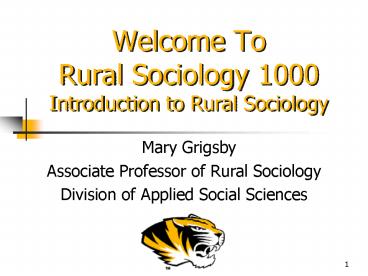Welcome To Rural Sociology 1000 Introduction to Rural Sociology
1 / 12
Title:
Welcome To Rural Sociology 1000 Introduction to Rural Sociology
Description:
Rodney Atkins- Watching You. 2. 3. TOPICS OF DISCUSSION. Class Business ... The process of discarding values and behaviors unsuited to new circumstances and ... –
Number of Views:110
Avg rating:3.0/5.0
Title: Welcome To Rural Sociology 1000 Introduction to Rural Sociology
1
Welcome To Rural Sociology 1000 Introduction to
Rural Sociology
- Mary Grigsby
- Associate Professor of Rural Sociology
- Division of Applied Social Sciences
2
Music
- Rodney Atkins- Watching You
3
- TOPICS OF DISCUSSION
- Class Business
- You must bring a pen to class next
- Wednesday to use in writing your exercise. Pencil
will not - be accepted.
- Defining rurality
- Groups
- Cooleys Looking Glass
- Self
- The Case of Noodling
4
Resocialization
- The process of discarding values and behaviors
unsuited to new circumstances and replacing them
with new, more appropriate values and norms. - Examples?
5
Groups
- As Agents of Socialization
- Share distinct identity (language, family
descent, military unit, noodling group) - Feel a sense of belonging
- Interact directly or indirectly with each other
6
Groups
- Primary Group-A social group that has
face-to-face contact and strong emotional ties
among its members. - Ingroup-Group with which people identify and to
which they feel closely attached, particularly
when that attachment is founded on opposition
toward an outgroup toward which there is a
feeling of separatness, opposition or even hatred.
7
The Looking-Glass Self
- Cooley maintained that the self is a product of
interaction experiences. - A sense of self develops through people acting as
mirrors for one another. - We see ourselves reflected in others reactions
to our appearance and behaviors. - We acquire a sense of self by being sensitive to
the appraisals of ourselves that we perceive
others to have.
8
Okie Noodling Questions
- Who are the significant agents of socialization
or significant others involved in teaching people
to noodle? - Draw on Cooleys concept of the Looking-glass
self in explaining why people become noodlers.
What sort of identity is being constructed?
9
Okie Noodling Questions
- 3. What is one norm that noodlers are socialized
to follow? Are the norms consistent by group or
developed on an individual basis? Explain with
noodler descriptions. - 4. What values are those who learn noodling being
socialized into?
10
Missouri NoodlersArticle by Mark Morgan (2006)
The Social Hierarchy of Fishing Myth or
Reality? in Human Dimensions of Wildlife
11317-327.
- N103
- 6 women
- 94 men
- 55 high school education
- 6 college education
- Over 90 lived in rural areas
- Most were in blue-collar professions (building
and construction, farming, Skilled trades)
11
Missouri Noodlers
- Group belonging based on trust, respect (pecking
order each other and the fish), community ties
of reciprocity - Collective Memory
- Value for self-sufficiency sharing toughness
courage skill, time in nature family time
together eating what you catch
12
Collective Memory
- The experiences shared and recalled by
significant numbers of people. Such memories are
revived, preserved, shared, passed on, and recast
in many forms, such as stories, holidays,
rituals, and monuments.































